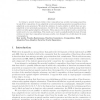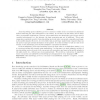469 search results - page 3 / 94 » On Adversary Models and Compositional Security |
CORR
2007
Springer
13 years 7 months ago
2007
Springer
We give a new, simulation-based, definition for security in the bounded-quantum-storage model, and show that this definition allows for sequential composition of protocols. Damg�...
CORR
2006
Springer
13 years 7 months ago
2006
Springer
Logics for security protocol analysis require the formalization of an adversary model that specifies the capabilities of adversaries. A common model is the Dolev-Yao model, which c...
SCN
2008
Springer
13 years 7 months ago
2008
Springer
We present an implementation of the protocol of Lindell and Pinkas for secure two-party computation which is secure against malicious adversaries [13]. This is the first running sy...
EUROCRYPT
2004
Springer
14 years 1 months ago
2004
Springer
In trying to provide formal evidence that composition has security increasing properties, we ask if the composition of non-adaptively secure permutation generators necessarily pro...
IACR
2011
12 years 7 months ago
2011
A zero-knowledge protocol allows a prover to convince a verifier of the correctness of a statement without disclosing any other information to the verifier. It is a basic tool a...


